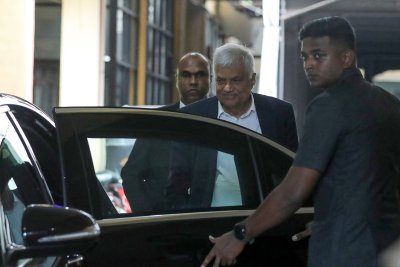1 of 2 | Former Sri Lankan President Ranil Wickremesinghe leaves the Commission to Investigate Allegations of Bribery or Corruption, after giving a statement related to an ongoing investigation under the Anti-Corruption Act, in Colombo, Sri Lanka, in April. He was arrested Friday on charges of misuse of public funds for travel he did while president. File Photo by Chamila Karunarathne/EPA
Aug. 22 (UPI) — Sri Lanka’s former president was arrested Friday for the alleged misuse of public funds, police said.
Ranil Wickremesinghe was arrested in Colombo, the Sri Lankan capitol, while giving a statement to the country’s Criminal Investigations Department. He’s been facing multiple government investigations into widespread bribery and corruption. The charge in his arrest was for using public funds for his personal travel.
Friday’s arrest was about a detour Wickremesinghe, 76, made to Britain in 2023 on his way back to Sri Lanka from an official visit to the United States. He made the stop to attend an awards ceremony for his wife, Maithree Wickremesinghe, who was awarded an honorary professorship from the University of Wolverhampton. The government alleged that it was a personal trip for which about $56,000 of public money was used.
Wickremesinghe was widely credited with helping put the country back on the road to economic recovery. He also served six separate terms as prime minister since the 1990s.
He made 23 foreign trips during his time as president, at a cost of more than $2 million, according to BBC Sinhala.
He served as president from 2022 to 2024, stepping into the role after the country’s worst ever economic crisis triggered a popular uprising that caused his predecessor Gotabaya Rajapaksa to flee.
Wickremesinghe’s arrest is the most high-profile case since the National People’s Power, a leftist coalition, won the presidential election in September. Its leader Anura Kumara Dissanayake became president. Dissanayake, 56, campaigned on a promise of weeding out corruption and prosecuting those who had misused public funds.
In 2019, Sri Lanka fell into a downward spiral, partly driven by poor policymaking by the government of Rajapaksa that depleted foreign reserves and eventually forced the country to default on its debt. Terrorist bombings in 2019 and the COVID-19 pandemic, which crushed tourism, also eroded the domestic economy.
By 2022, when Sri Lanka’s foreign exchange reserves ran so low that it couldn’t buy fuel, public anger led to protests and the ouster of Rajapaksa.
As president, Wickremesinghe helped secure an International Monetary Fund bailout in 2023. But the deal required austerity measures. Those unpopular policies, a growing sense among people that he was part of the old guard, and discomfort that he was close to Rajapaksa, led Sri Lankans to reject him during last year’s elections.
